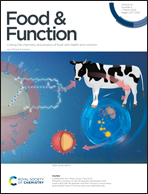Potential skin health promoting benefits of costunolide: a therapeutic strategy to improve skin inflammation in imiquimod-induced psoriasis
Abstract
Psoriasis is a recurrent inflammatory skin disease. IL-36-related cytokines are overexpressed in psoriasis, but the mechanism is not yet clear. Costunolide (Cos) is a sesquiterpenoid compound derived from the root of the traditional Chinese medicine Aucklandia lappa Decne. This study aimed to explore the mechanism of Cos on improving psoriasis-like skin inflammation. An in vivo model was established by applying imiquimod treatment to the back skin of mice, and an in vitro model was established by using polyinosinic–polycytidylic acid (Poly(I:C)) stimulated-mouse primary dermal fibroblasts to induce inflammation. The results showed that Cos improved the pathological changes of psoriasis-like skin inflammation. In addition, Cos could inhibit epidermal damage and inflammation-related expression and improve the occurrence of skin-related inflammation in both in vivo and in vitro experiments. The improvement of psoriasis-like skin inflammatory response might be through the P2X7R/IL-36 signaling pathway. Collectively, Cos has an inhibitory effect on the expression of psoriasis-like skin inflammation. This showed that Cos has potential skin health promoting benefits by preventing psoriasis-like skin inflammation.



 Please wait while we load your content...
Please wait while we load your content...